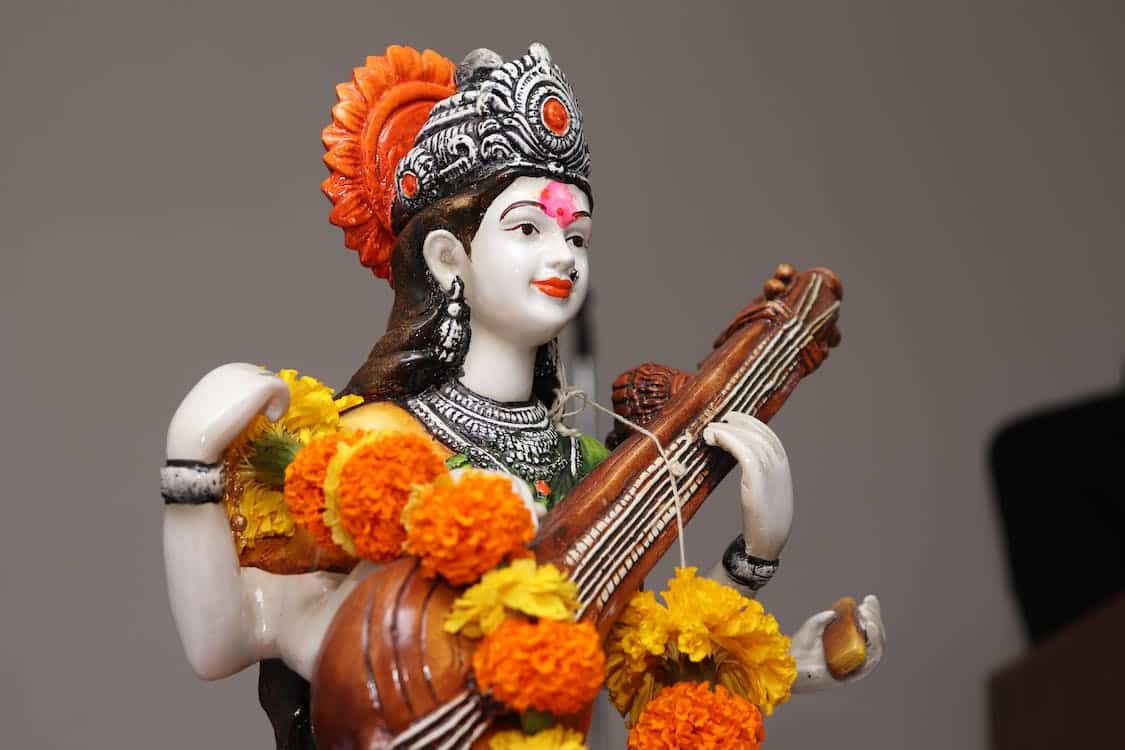
Spirituality
Vasant Panchami, a celebration of spring and Maa Saraswati
Vasant Panchami is a Hindu festival that marks the arrival of spring. It is celebrated on the fifth day (Panchami) of the Hindu month of Magha, which typically falls in late January or early February. The word “Vasant” means spring, and “Panchami” refers to the fifth day.
The primary significance of Vasant Panchami is associated with the worship of Maa Saraswati, the Goddess of knowledge, wisdom, music, and the arts. Devotees believe that on this day, Goddess Saraswati first appeared in the Universe. Maa Saraswati is revered as the source of knowledge and creativity, and she is considered to have blessed her devotees with wisdom, learning, and artistic skills.
With deep reverence and unwavering faith, students engage in the worship of Goddess Saraswati on the auspicious day of Vasant Panchami. Temples become vibrant centers for special ceremonies and Pujas dedicated to Goddess Saraswati.
For those desiring to invoke the blessings of Mata Saraswati within the sacred confines of their homes, we have come up with a blog explaining the Vasant Panchami Puja. Let us explore the steps of this worship, accompanied by the chanting of mantras, to connect with the divine energy of Divine Mother Saraswati.
What you need to perform Vasant Panchami Puja:
Clean clothes (yellow or white), lamp, Ghee (clarified Butter), statue or picture of Mother Saraswati, Maa Saraswati Yantra (optional), books and notebooks, musical instruments (if you play any), yellow-colored clothes to offer, turmeric, sandalwood, cotton wick, white and yellow flowers, Akshat, sweets, a meditation space etc…
Vasant Panchami Maa Saraswati Puja:
Early Awakening: Begin your spiritual journey on the day of Basant Panchami by waking up during Brahma Muhurta, the sacred time before dawn. After arising, take a purifying bath and don clean, yellow or white attire.
Illuminate Positivity: Light a lamp filled with ghee to invite positive vibes into your surroundings, creating an atmosphere conducive to spiritual connection.
Sacred Setup: Place the idol or image of Mother Saraswati in the northeast corner. If you have a Maa Saraswati Yantra, put a handful of turmeric-colored raw rice in the Puja Thali and place the Yantra on top of it. Position your books, notebooks, and any musical instruments on the altar alongside the image of Yantra.
Symbolic Offerings: Adorn Mother Saraswati with yellow-colored garments and present offerings of turmeric, sandalwood, cotton wick, white and yellow flowers, and Akshat with sincere devotion. Extend your offerings to the books and musical instruments as well.
Sweet Devotion: Express your reverence by offering sweets to the divine mother, signifying your heartfelt dedication and gratitude.
Floral Blessings: Place white and yellow flowers on the notebooks and musical instruments, symbolizing the infusion of divine blessings into your studies and artistic pursuits.
Mantra Chanting: Engage in the recitation of mantras devoted to Mother Saraswati. Begin with the mantra “Ayiem Vannye Swaha.” Chant audibly initially, gradually lowering your volume until you can silently recite the mantra, immersing yourself in meditation before the sacred altar.
Divine Wisdom: Recognize the potency of the mantra as it belongs to the Divine Mother Neel Saraswati. The seeker of knowledge and spiritual wisdom should embrace this mantra during meditation, seeking enhancement in intelligence, memory, and the power to fulfill resolutions. The mantra is renowned for bestowing life-changing wisdom upon those who earnestly seek it.
Meditative Closure: Conclude your spiritual practice with a period of meditation on Mother Saraswati, absorbing the transformative energy invoked by the powerful mantra.
Aarti Ritual: Culminate your worship with the performance of Aarti, a symbolic gesture of devotion, gratitude, and a harmonious connection with the divine.
Significance of Vasant Panchami Puja
Worshiping Goddess Saraswati on Vasant Panchami is thought to bestow blessings of wisdom, intelligence, and knowledge. Students and seekers often engage in this Puja to seek guidance in their studies and spiritual pursuits.
Divine Mother Saraswati is also the patroness of the arts. Devotees believe that her blessings enhance artistic and creative abilities. Individuals involved in music, dance, writing, and other creative endeavors seek inspiration through this Puja.
She is associated with eloquence and effective communication. Those who wish to improve their speech and expression may engage in this Puja to seek the Goddess’s guidance in refining these skills. This Puja is seen as a means to sharpen the mind, improve memory, and promote analytical thinking.
Beyond academic and creative pursuits, Vasant Panchami Puja is considered a pathway to a spring season, as well as to spiritual enlightenment. Devotees seek the Goddess’s guidance in their spiritual journeys, aiming for inner wisdom and understanding.
As you engage in the rituals of Vasant Panchami, may your academic pursuits be guided, your creative endeavors flourish, and your spiritual journey be filled with enlightenment. Let the vibrant energy of spring and the divine presence of Saraswati bring joy, success, and fulfillment into every facet of your life.
Jai Maa Saraswati!!!
Please subscribe to our mailing list to stay connected and receive spiritual information. If you have any queries, please write to us at info@chamundaswamiji.com. You can check out our YouTube channel, Chamunda Swamiji, where you can learn Tantra, Mantra, Yantra, and Meditation from His Holiness Shri Chamunda Swamiji. If you seek to learn Shakti Kriya, please register with us, and we will get back to you.
Post a Comment
-
Subscribe to Our Blog
-
Categories
-
Popular Articles
- Dead moth in the house. What universe is trying to tell you?
- Spiritual Meaning of Moth
- Vivah Bandhan Curse – What Is It and How to Spiritually Heal It.
- What are Beej Mantras?
- The Dasa Mahavidyas
- Tripura Sundari | The Dasa Mahavidya
- Maa Bhuvaneshwari | The Dasa Mahavidyas
- Ramakrishna Paramhansa – The Man who almost became a Woman
- The Five Shades of Tantra
- Maa Chinnamasta | The Dasa Mahavidyas



